Ask anyone in Europe's transport sector about what kind of company Kotra Logistics is, and nine times out of ten, they will say: a fish transporter. "That label will stick with us for the foreseeable future; after all, we're one of Europe's top ten fish transporters," begins Leo van Dillen.
He is on this Dutch logistics provider's five-member board of directors. "But we do much more. Along with fish and seafood, we also increasingly transport, for example, frozen and refrigerated packaged products (MAP), like meat, fruit and vegetables, and baked goods."
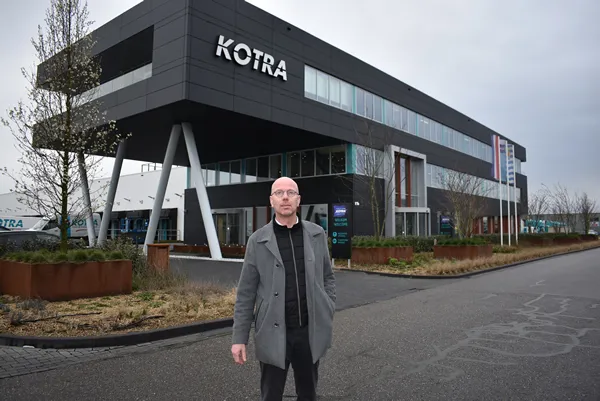
Leo van Dillen in front of the company's new office
"Some years ago, we decided to build a 3,00m2 cold store especially for storing and transshipping dry-cooled products. Our fish reaches supermarkets in Benelux, France, Germany, Switzerland, Austria, Italy, Spain, and the United Kingdom. We can also supply those customers with other product groups besides fish. The MAP-packed goods are leak and odor-proof and can thus be perfectly combined with the fish products," says Leo.
"Since the pandemic, clients seem to have lowered their threshold for using combined transport. We saw this earlier in Belgium, where we've been supplying retailers for years, but it's now happening in other countries, too. The great thing was that some retail customers had already recommended us as a carrier to other clients. So, we could also gradually add fruit and vegetable products."
Spreading activities
"Our first major customer was a vegetable processor, and we're slowly expanding our fruit and vegetable activities. Vegetable transport isn't entirely new to us. When I started here 22 years ago, we were already transporting small quantities of vegetables for Maarten Mooy outside the mussel season. The whole sentiment around fishing is negative. The government's attitude towards working people, whether in horticulture or fisheries, with all the laws and regulations, certainly doesn't benefit that business community," Leo continues.
"That's why we're not putting all our eggs in one basket. And why we want to grow our frozen and conditioned transport activities; there's still plenty of growth potential there. We can use our extensive fish transport network. German DCs have been using things like block times for much longer. In the Netherlands and Belgium, discounters, especially, are also moving more and more toward that."
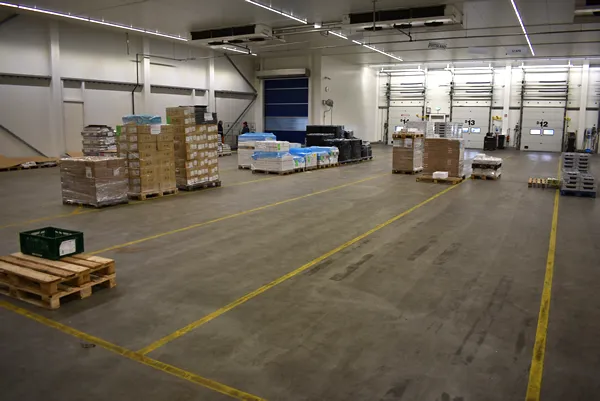
"Groupage makes up no less than 95% of our transport activities. The group as a whole handles about 13,000 orders per week, that's roughly equivalent to the number of pallet spaces. Orders range from a box to full loads. We see a lot of potential for fruit and vegetable transportation, especially in Belgium," says Van Dillen.
"There, we've been docking mussels at the Aldi DC on time - at 10 p.m. - for years. We can do the same with other products and thus reduce CO2 considerably. We have the capacity and the space, so these streams can be included in a single flow." Leo admits there are undoubtedly cultural differences between fish and fruit and vegetables. "But both are involved in day trade," he says.
New office
Kotra has expanded considerably in the past few years. From about 100 trucks in early 2009, the fleet has grown to 190 company-owned trucks and nearly 200 trailers. Recently, the French transport company Delanchy Transports took a 49% minority stake in Kotra Logistics. CEO Erik de Koeijer still holds a majority stake. Just last August, they inaugurated an attractive new office in the Netherlands.
Construction also started last year on new premises in Germany. Kotra already has so-called 'hubs in five other German cities, including Berlin. The new hub will further strengthen and streamline operations in Germany. The group employs 600+ people and has branches in both the Netherlands and Germany. Turnover is around €100 million.
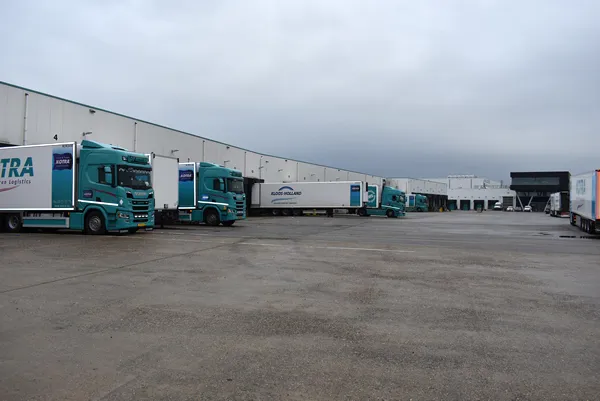
Filling vacancies remains challenging, but according to Leo, good progress has been made. "Many of our people stay for years. There was a time when we struggled to get drivers or charters, but we ran a major campaign, and it paid off. We welcome appropriate lateral entrants, switchers, and those taking the old driver training program."
"We also acquired a relatively small Belgian company in Belgium, adding more drivers and vehicles. We get many college and university logistics students interns too. The equipment we drive in and the new building we put into service last summer definitely work in our favor," Leo explains.
Transport price increases are unavoidable this year. "We didn't do this in the two pandemic years; it was impossible. But, this year, we did raise our rates. Some customers understand, given all the chain cost increases. We've been using a monthly-adjusted fuel surcharge for some time."
"Unlike our cold store, we don't (yet) add an energy surcharge for transport. Fortunately for our clients, diesel prices are now slightly down because that recently accounted for a significant share of the cost price. I expect costs will be structurally higher than a few years ago," Leo adds.
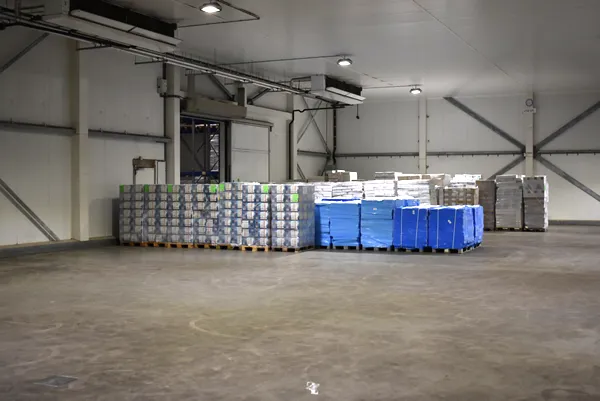
Despite developments in LNG, hydrogen, and electric driving, these are not currently considered alternatives for Kotra's trucks. "We follow those developments closely, but our vehicles drive an average of 700 to 1,000 km/day. With that, there's no alternative to diesel. But the moment good opportunities arise for, say, electric driving for city distribution to Antwerp or Brussels, we'll look into it."
"Digitalization is another priority. We get many digital orders, and, at unloading, those are processed via a Transfollow eCMR, thus eliminating paper. We now produce almost 25,000 eCMRs per month and would like to increase that. For some customers, this takes some getting used to, but they, too, should experience the benefits. Ultimately, everyone wins when things run faster and more efficiently," Leo concludes.
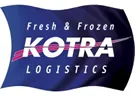 For more information:
For more information:
Leo van Dillen
Kotra Logistics
Tel: +31 (0) 113 743 011
Mob: +31 (0) 611 327 812
Email: [email protected]
Website: www.kotra.nl
